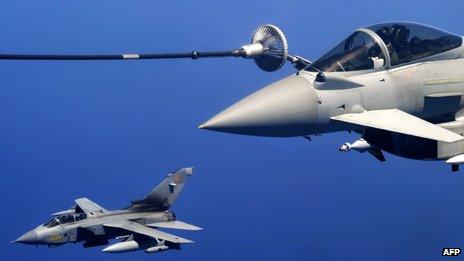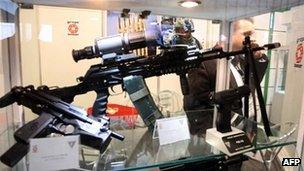A Point of View: Why euphemism is integral to modern warfare
- Published
- comments

The arms trade, and the UK's role within it, relies on business-speak and foggy language, writes Will Self.
One of my favourite cartoons was published by the New Yorker magazine way back in the early 1980s.
It shows some soignee types consorting - their diaphanous gowns suggest that they're divine, their cocktail glasses that they're merely sophisticated. The location for this party is one of those chimerical realms that only the sparse pen-and-wash of a first-class cartoonist can summon up - it could be Mount Olympus, but it could just as easily be the Upper West Side of Manhattan.
Anyway, a svelte, gowned female is introducing another more robust, gowned male to a third partygoer, while announcing, "I believe you know Mars, god of defence."
Euphemism - along with its kissing cousin, jargon - is integral to modern warfare - indeed, it's difficult to imagine a conflict in recent years that hasn't spawned its own little lexicon of obfuscation designed to sanitise the miserable and sickening business of uniformed young men eviscerating one another with high explosive, while drawing a veil over the so-called "collateral damage" wreaked upon civilians.
Recent wars have been prosecuted by means of "surges", "operations", and "tactical strikes" - terms that imply the life-saving activities of doctors rather than the life-discarding ones of warriors.
It's probably no coincidence that our own War Office was renamed the Ministry of Defence in 1964, the year when the Tonkin "incident" led to the "escalation" of the "conflict" in Vietnam. True, the British government took no direct part in the "winning of hearts and minds" or the "deployment of Agent Orange", but we did our bit by carpet-bombing our own sensibilities with such highly-toxic euphemisms.
Almost a half-century later we're still at it, and while the vanguard is formed by that bewildering phenomenon, "humanitarian intervention", it is in the vital area of "logistical support" that we Britons have proved ourselves most linguistically adept.
Consider this, a few weeks ago DSEi was held at the ExCel Exhibition Centre in London's Docklands. It sounds innocuous enough, doesn't it, just another tedious trade fair full of men and women in suits with plasticised passes dangling from the lanyards around their necks.
Even when you tease those initials out to read Defence and Security Equipment International it remains ineffably dull, but perhaps a little more urgency accrues when you consider that this enormous bazaar of bombs, guns and assorted other lethality is organised in association with your own government, a government that, the preceding week, sent speakers to an event entitled - with commendable directness - "The Middle East: a vast market for UK Defence and Security Companies."
So, even as Gaddafi's forces were being destroyed in bizarre battles that pitted British weapons against other British weapons, plans were afoot to sell still more of the same to authoritarian regimes in the Middle East - such as Saudi Arabia and Bahrain - with documented histories of human rights abuses.
Throughout the first two quarters of this year, even as tensions in the region reached boiling point, arms sales were approved by the British government to Algeria, Bahrain, Saudi Arabia, the United Arab Emirates and Yemen.
It has become a commonplace of political discourse since the banking crisis of 2008 to compare the national finances to those of an individual or a family. You cannot - or so we are admonished by our current rulers - continue to run up more debts, when your credit cards are already maxed-out.

The arms trade is worth 1-2% of UK total exports
But why shouldn't we apply the same domestic analogy to the conduct of states themselves? If we consider a government that attacks its own citizenry to be on a par with a homicidal maniac who stabs his wife, then what does that make the government/person who supplies the knife other than an accessory to uxoricide?
Put like this, the reported remark by Gerald Howarth, the junior defence minister, on the "debt" that Iraq and Libya owe to Britain comes into the tight focus of literalism: "We liberated the Iraqis from a tyrant, we liberated Libya from a tyrant, frankly I want to see UK business benefit from the liberation we've given to their people." In other words, having sold plenty of knives to this bloodthirsty family, we expect gratitude to take the form of the Libyans buying more.
The elision of business-speak with the foggy verbiage of warfare is perhaps the most deranging aspect of the contemporary arms trade.
The existence of a government unit devoted to promoting arms exports is not that surprising given successive prime ministers have also acted as de facto salesmen for British weapons manufacturers - that this unit should be called the UK Trade and Investment Defence and Security Organisation - usually abbreviated to a string of inert initials: UKTI DSO - cloaks it with the spuriously prosaic legitimacy of flogging widgets. Time and again we are told that the arms industry - and by extension, arms exports - is an essential component of our economy and vital for that most vital of things - jobs.
Yet while we can quibble about the precise figures, the government's own statistics suggest that arms in fact only comprise 1%-to-2% of our total exports. Moreover, it's difficult to think of widget exporters who are promoted - in the way that arms ones have been - by extensive government support.
But anyway, even if large numbers of British jobs were utterly dependent on selling arms to the Sri Lankans so they could pulverise Tamils, or to that delightful euphemism the Israeli Defence Force, so that they could - employing an apt Biblical figure of speech - smite the Gaza Strip, can that really dignify such labour? Personally, I'd rather flip burgers or sign on for Jobseeker's allowance than forge death-metal in Vulcan's furnace.
Would I, I hear you ask, actually prefer it if arms exporters and their political sales force dropped all the indirection and cut straight to the chase by admitting freely that weaponry is nothing more or less than the extension of diplomacy by potentially violent means?
Absolutely, let's call a spade a spade, a gun a gun, missile a missile, a cluster bomb a child-killer and a Tactica armoured car a means of brutal civilian repression when it's deployed by the Saudis to support the undemocratic government in Bahrain. Manufactured by BAE Systems, a British business and one of the biggest arms companies in the world, the Tactica shouldn't be allowed to go quietly about its strategically lethal and profitable business.
But then BAE Systems are the past-masters of periphrasis when it comes to their deals with the Saudi regime. In 2007 BAE signed a contract to sell them 72 Eurofighter Typhoons in a £4.4bn deal called the Salaam Project - salaam, is of course the Arabic for "peace".
This being just the latest instalment of the far larger Al Yamamah - or "the Dove" - deal brokered by Jonathan Aitken, among others, under the Thatcher regime. The wing-beats of the Dove - said to be the biggest sale of weapons to anyone, by anyone, ever - have been troubling successive British governments for years now but sadly I don't have the time to guide you around all the giddy twists and turns of its circumlocution.
Let a few plain-spoken facts suffice: the widely-alleged existence of a vast BAE slush fund with which to bribe Saudi government officials was under investigation by the Serious Fraud Office until they were called off following pressure from Tony Blair in 2006 on the grounds of the Mother of All Euphemisms, national security.
Because the truth is there was a lot of national insecurity bound up in this, what with the alleged involvement in Al Yamamah of such luminaries as Mark Thatcher. Another world-class epigone, Prince Andrew, was heard at a dinner in Kyrgyzstan to decry the "idiocy" of the SFO, but then he was a special representative of UK Trade & Investment at the time - so that's wholly understandable.
No, I fear that Mars moves in very murky and mysterious ways indeed, and we mere mortals are unlikely to be able to shine a searchlight upon them - at least, not until Apollo stops being the god of 40 watt light bulbs.